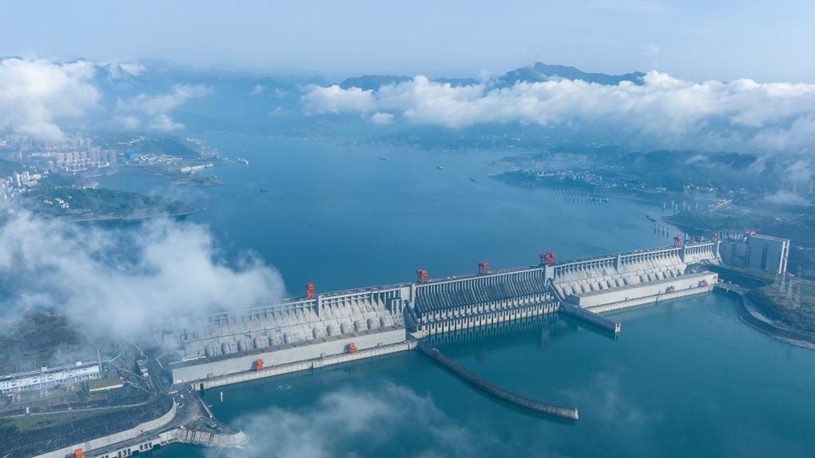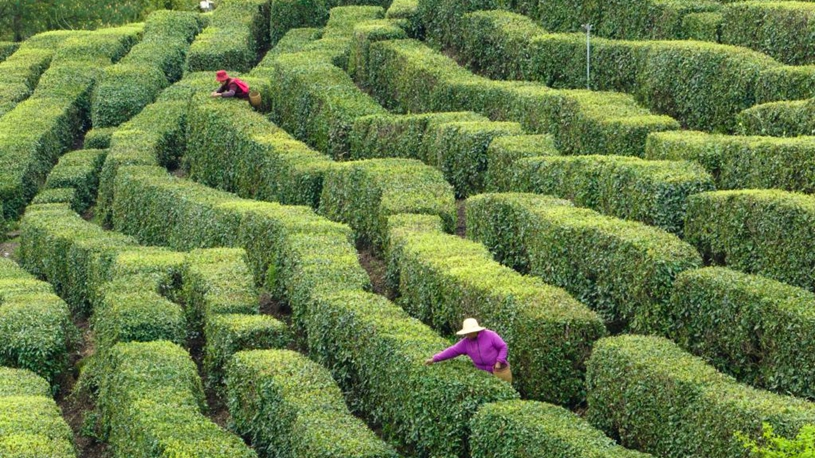
A 3D model of Kuantan Port and Malaysia-China Industrial Park (MCKIP) shot at Kuantan, Malaysia on March 23, 2023. (Photo by Chong Voon Chung/Xinhua)
Many Malaysian youngsters have tangibly benefited from increased job opportunities as new BRI projects are gaining ground, which improve their prospects and help sharpen their occupational and language skills.
KUALA LUMPUR, April 9 (Xinhua) -- Major infrastructure projects have been launched in Malaysia under the Belt and Road Initiative (BRI), which have boosted development and job creation along the Southeast Asian country's east coast, creating employment opportunities for the Malaysian youth.
In particular, the Malaysia-China Kuantan Industrial Park (MCKIP) and the Kuantan Port, both located in Pahang state, have seen strong demand for a skilled workforce where talented young Malaysian graduates have found a home.
Among these eager workers is 27-year-old Nursuhada Mazlan, who has been working as an administrative specialist at the Alliance Steel plant in the MCKIP since 2019.
Nursuhada, whose job is to monitor staff attendance and other administrative matters, said working with the Chinese company has allowed her to find satisfaction through career progression and personal development, including classes to learn the Chinese language.
"I first learned Chinese in school but lost touch. When I started working here classes were offered. At first, it was difficult. But I have gained proficiency, which helps me communicate better with my Chinese colleagues," she told Xinhua, adding that she had learned to work more efficiently and deliver targets expected by her superiors.
"More than that, I have seen the development and progress of Kuantan since the launch of MCKIP. I would also like to visit the sister park, China-Malaysia Qinzhou Industrial Park (CMQIP), if there is an opportunity," she said.

Guests attend the groundbreaking ceremony of the Malaysia-China Kuantan international logistic park in Kuantan, Malaysia on April 7, 2023. The Malaysia-China Kuantan Industrial Park (MCKIP), the first industrial park jointly developed by Malaysia and China, marked its 10th anniversary here on Friday.(Photo by Chong Voon Chung/Xinhua)
The MCKIP, the first industrial park jointly developed by Malaysia and China, marked its 10th anniversary on April 7. The MCKIP, together with the CMQIP in China, has set an innovative example of bilateral economic cooperation under the model of "two countries, twin parks."
For Norfazila Sukur, 28, who has been working with Alliance Steel for five years, the experience has been an expansive and fulfilling one. "I improved myself. I feel my quality of life has improved and I have grown personally," she said, adding that the good salary she receives has allowed her to live independently.
The job has allowed Norfazila to pick up additional skills, besides the worker safety and environment that is her job scope, such as emergency response and safety management.
"I also gained a greater appreciation for the Chinese language. I learned how words can have multiple meanings. It's broader than I thought. Of course, I also learned many words and terms related to my work," she said.

The deep water terminal of Kuantan Port shot at Kuantan, Malaysia on March 22, 2023. (Photo by Chong Voon Chung/Xinhua)
The MCKIP is close to Kuantan Port to be linked by the Chinese-built East Coast Rail Link (ECRL), which runs from Malaysia's largest transport hub Port Klang and travels across the peninsula to Kelantan state in northeastern Malaysia.
Shervynn Lee Xue Yin, 27, who works as a senior operation administration executive at Kuantan Port and hails from the northern Borneo state of Sabah, said her superior from China had encouraged her at her work, which is traditionally seen as a male-dominated field.
"When I first started working here, someone told me that it's not easy for women to work in operations but when I met my boss from China ... he told me that I have to believe in myself," she said, adding that her boss taught her the importance of her role in the post for planning and management.
Lee had learned much from her Chinese colleagues on how to develop her occupational skills. "When I have tasks assigned to me, I learned to be more responsible in everything I do and I learned to think ahead before anything happens," she said.
The BRI, a reference to the Silk Road Economic Belt and the 21st Century Maritime Silk Road, was initiated by China in 2013 to build trade and infrastructure networks connecting Asia with Europe and Africa on and beyond the ancient Silk Road trade routes.■












